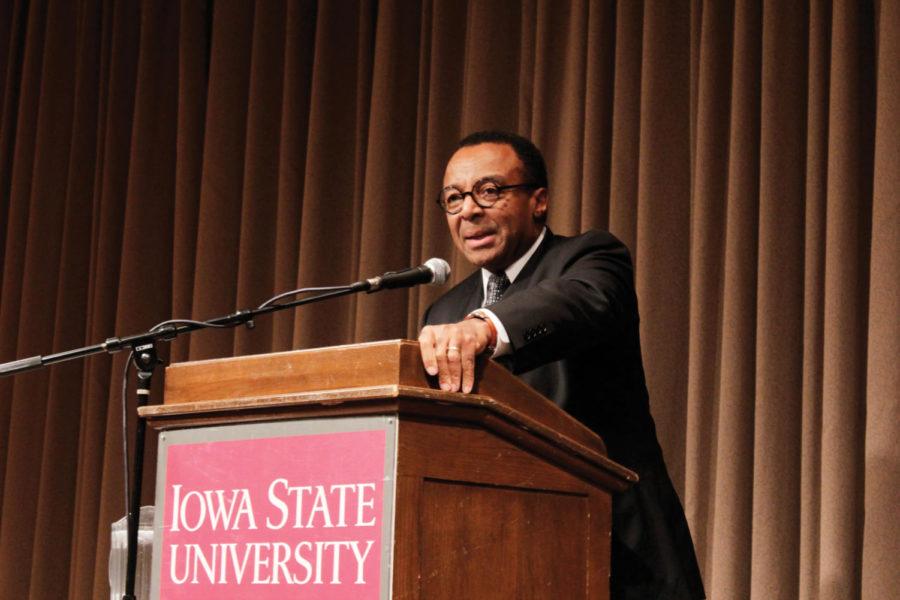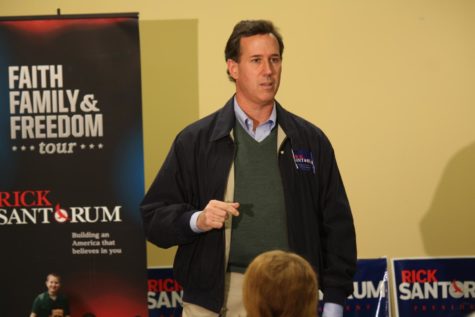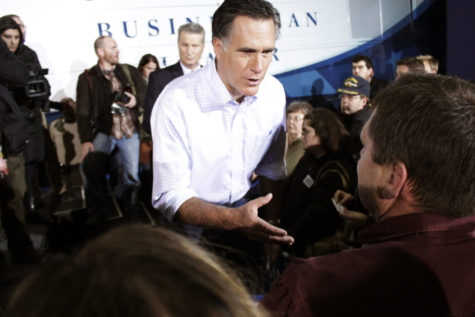Guest Column: Writing the narrative: Why Iowa matters — or not!
Photo: Kelsey Kremer/Iowa State
Clarence Page, member of the Chicago Tribune’s editorial board, served as the keynote speaker of the Chamberlin Lecture at the Memorial Union on Wednesday, Sept. 14th. Page addressed Iowa’s role in the upcoming presidential elections in the annual lecture.
September 23, 2011
Every year has its big buzzwords. Who could forget — no matter how much we might like to — such hits from years past as “chad,” “swift boat” and “lipstick” as it might be smeared on a pig — or a pit bull?
A year ago at this time, “the narrative” was the biggest political buzzword in the English-speaking world, according to the Austin, Texas-based Global Language Monitor, a website that keeps track of such things.
“The narrative” was beating out “climate change,” “Obama Muslim,” “lower taxes” and even “tea partyers.”
By the end of the year, “the narrative” turned out to be the third most important buzzword or buzz phrase of 2010, out stripped only by “spillcam”(BP’s underwater camera on its Gulf oil spill) and “vuvuzela” (those annoying plastic horns from the South African World Cup).
I was not surprised. In today’s media age, a good narrative has all but replaced the need for a candidate or a party to have a good platform.
The late Sen. Daniel Patrick Moynihan famously said, “You are entitled to your own opinion but not your own facts.” Were he around today, he might well be amazed to see how much of today’s news audiences increasingly feel entitled to their own facts — as delivered by their chosen media outlets: in print, talk radio, cable news and the Internet.
Just as American parents shop for public schools when they shop for a house, today’s audiences choose their own narratives when they choose their media.
Whether they realize it or not, they’re shopping for their own “narrative,” also known as “spin,” “public image,” “propaganda” or “party line.”
An old saying: A trial is a contest to see who hired the best lawyer. Campaigns are like trials: a contest to see which side can spin the best narrative — the most appealing and persuasive version of itself.
The economy is the big narrative issue this year, but an effective campaign can even persuade you to vote against your own economic interests, if it can appeal to you through other values, ideologies, hopes, fears or dreams.
That’s why Iowa matters. Besides, Iowa has charm — enough charm for us visitors to forgive such oddities as the Ames Straw Poll or fried butter on a stick.
The emerging narrative of Campaign 2012 appears to be, in a word, anger. A recent CNN poll asked a direct question: Are you angry about the state of the country? Seventy-one percent said yes, only 27 percent said no.
If the last election was about hope and change, the new one is about loss of hope because of changes that have taken place, whether as a result of the president or in spite of him.
The big question for Republicans has become: Which candidate can express the anger of the party’s conservative base?
Former Minnesota Gov. Tim Pawlenty dropped out early because, try as he might, he could not beat the emerging narrative of the GOP’s 2012 primary races. He was a nice, moderate conservative in an angry, far-right conservative year.
Political coverage tends to be geared either to issues or “the horse race,” which focuses less on the issues than the politicking: strategies, endorsements, gains, setbacks and, more than anything else, the polls.
The question in the horse race is less about what Obama actually says in his jobs speech, for example, but more about how those words will play into Mitt Romney’s chances to beat Rick Perry on the electability scale.
Or emerging issues on the public mind get lost.
Or worse, a false narrative takes hold, either by mistake or somebody’s intentional propaganda.
Part of the anger I have picked up at tea party rallies — and other angry voters — is aimed at media and deep-pocket party leaders who seem to decide on what the people are going to vote before the first vote is cast. I am delighted when my fellow pundits and I predict election outcomes — and guess wrong. When voters surprise in the privacy of the voting booth, it reassures me that we are not living in Castro’s Cuba or Kim’s North Korea.
What is to be done?
Today’s media-rich environment puts a greater obligation than ever on news consumers to make intelligent choices. So, caveat empto: Let the buyer beware.
We enjoy our free press and our freedom to choose leaders. But, as Martin Luther King Jr. used to say, freedom is not free. Candidates spend hundreds of millions of dollars to drive the campaign narrative. The press and the people can — and must — do all they can to take it back.









